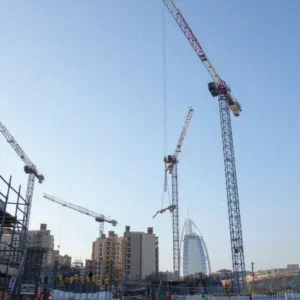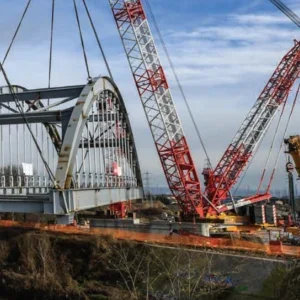Energy has always been an important part of the US crane market providing both rental companies and manufacturers with work tapping the many fruitful natural resources the land has to offer to service the world’s largest economy. As the US steadily recovers from the 2008 financial crisis it is energy once again that is the driving force behind the country’s improving financial situation revitalising the nations lifting industry in the process.
"Many people in the North American market like to talk about housing as a driver for the crane market but that sector still has a long way to go" says Manitowoc’s John Bittner: "The US market for cranage is strong but it is being driven primarily by one sector: energy. Within that sector it’s oil and natural gas that’s really had an impact and five or six years ago it wasn’t as major of a force in the market. But fracking has changed the game and now it’s a very significant part of the overall energy sector."
"For some of our customers wind power provides growth but it’s unlikely to rival natural gas in the long term. Solar is probably the smallest section of the energy market but there are some large projects out there in the Western US. Some companies are seeing rental utilisation on the rise it’s not booming but it is improving. We are trying to be optimistic. However we have learnt to adjust to the new realities of the marketplace."
Within the US crane industry there is definitely a sense that although growth is slow the market is demonstrating some positive signs and that better conditions are not too far off as Michael Brooke, North America sales manager of LSI Robway, explains: "The lack of overall business and the flat economy are definitely issues. Everyone is confident the market will improve but we don’t know when. It’s not good, but its not terrible, we’re confident of growth but it’s a question of time, will it improve at the end of this year or the beginning of next year?"
"Energy is still the driving force across the board. Within that sector oil and gas are the source of a lot of the growth, but there is also a fair bit of investment in electricity and nuclear."
Brookes continues,To be honest there’s not really any energy that’s left out. Oil prices have dropped which is worrying because that means a drop in the investment from those firms involved in that industry."
Adapting to the climate
With many fingers still burnt from the global financial crisis and subsequent recession it is unsurprising that any optimism surrounding the US market is stil pretty cautious. How a firm reacts in these conditions reveals a lot the company’s approach to business. When the financial conditions are favourable it’s easier to take risks and make bold decisions, but tougher times require innovation that yield more clearer and more immediate results.
In such a financial climate company’s must to develop new differentiators focused on giving the customer greater value. Manitowoc for example has pushed its EnCORE crane care re-manufacturing service to great effect, John Bittner continues: "Our emphasis on remanufacturing is twofold. Cranes are different from earthmoving equipment, they don’t self-destruct working daily in tough conditions so you can easily get a second life out of a crane, so we offer that through the EnCORE programme. We like to provide a sustainable product. It’s simple economics. Why get rid of the equipment if it’s not economical to do so?"
"We want to be a full service OEM and this is why the worldwide Manitowoc Crane Care organization exists. We certify our EnCORE dealers so the cranes they repair or refurbish are built to factory specs. This is a full process, full certification to make sure you are getting good quality refurb or re-build jobs. It’s not just anyone rebuilding the cranes and that’s important. There has always been a demand for quality repair and reliability."
"Another factor to consider is the attachments and accessories when looking to rebuild an older crane, new additional costs come from having to purchase these items along with a new crane, and in a business where such expenses are hard to come by this can be an issue."
It’s not just the crane manufactures that need to demonstrate to the customer that they offer much more than just a good product. American remote control manufacturer LSI Robway has also been devising new ways to extend its appeal, Michael Brooke explains: "Our focus is to get our field sales guys to go out and work with the customer and assist with their needs. We offer 24/7 tech support and believe that that distinguishes us from our competitors. Which is more important now than ever before. Everyone might have the same technology so it becomes a question of how well you build it and if you offer good support. Those are the crucial factors."
Customer service is vital to LSI Robway in other ways too working closely with the customer can lead to new features that are eventually adapted to be part of new devices, Brooke continues: "It often happens that a customer approaches us and we will have to custom build a device for their business, that’s why we have had for many years a custom section of the business. In the 15 years of LSI Robway many of the developments that we have made came from us working with customers and end users. Recently one of these was the new wind speed sensor."
Linking a products features to the company’s aftersales services is an important factor in making these offerings count. Brooke continues: "For us the difference between wire based and wireless technology is that wireless systems are modular. With cable based systems problems can be harder to locate. It makes it easier for us to find out what is wrong and where it it is wrong. It means that it is far easier to solve problems over the phone rather than by getting technicians out. It’s very much a process of elimination where tech support can bring up a specific display and mirror the customers experience, seeing what they see and addressing the problem quite clearly. The support is 24/7 and comes at no extra cost."
Even in the toughest financial conditions opportunities present themselves to certain businesses. US crane repair business Whecco is has been reasonably successful and even expanded at a time when other businesses have been scaling operations back. "Business is relatively good" says Whecco’s Jay K. Shiffler, VP Director of Business Development, "the essentials are the same its all about finding good people. We used the downturn as an opportunity to open a shop region where we previously didn’t have a presence."
Using market conditions to a company’s advantage is something that has also been noticed by Industrial Training International’s vice president and chief operating officer Zack Parnell: "I would say that business is going well. We have seen a lot of consolidation that’s been happening in the crane industry there have been a lot of companies on the acquisition trail." If such trends continue it won’t be long before the US lifting industry can begin to emerge from the financial constraints that have limited it for the past five years."






